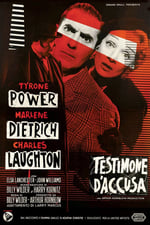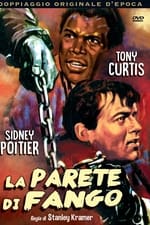Informazioni Personali
Conosciuto Per Suono
Crediti Conosciuti 53
Sesso Maschio
Compleanno 13 luglio, 1921
Giorno della Morte 17 marzo, 1999 (77 years old)
Luogo di Nascita Vienna, Austria
Conosciuto anche come
- Ernst Gold
Valutazione Contenuto
100
Sì! Sembra buono!
Entra per segnalare un problema
Biografia
From Wikipedia, the free encyclopedia
Ernst Sigmund Goldner (July 13, 1921 – March 17, 1999), known professionally as Ernest Gold, was an Austrian-born American composer. He is most noted for his work on the film Exodus produced in 1960.
Career NBC Orchestra performed Gold's first symphony in 1939, only a year after he moved to the United States. In 1941, he composed a symphony that was later played at Carnegie Hall in 1945. Gold moved to Hollywood in the same year to work with Columbia Pictures, his first significant role being the score for the melodrama Girl of the Limberlost (1945). After this opportunity, Gold wrote scores for other minor films. For the next ten years, he continued to work on B movies, mainly orchestrating and arranging music for western movies and melodramas.
He was asked by Stanley Kramer to orchestrate Not as a Stranger (1955). The music for the film was written by George Antheil. This production opened the door for Gold to work with other scores written by Antheil and to orchestrate more of Kramer's films. Gold worked on almost every film Kramer made, including A Child Is Waiting and It's a Mad Mad Mad Mad World.
Gold produced his first original film score in 1958 for Too Much, Too Soon. His big break came in 1959, when he was asked to score On the Beach (1959 film) after Antheil became ill and he recommended Gold for the job.
Gold is most widely recognized for his work on Exodus (1960). He was contracted by Otto Preminger and, atypically, was able to watch the filming of the movie. Gold spent time in Israel to write the score.
In 1968, Gold wrote a Broadway musical called I'm Solomon. He also wrote music for television including Fun with Dick and Jane. In his later life, Gold was the musical director of the Santa Barbara Symphony Orchestra. He also founded the Los Angeles Senior Citizens Orchestra.
His concert works include a piano concerto, a string quartet, and a piano sonata. Ernest Gold's "Fight for Survival" from Exodus was sampled by Moby in his song Porcelain.
Gold's contributions were recognized with Academy Award nominations and Golden Globe nominations. He won a Golden Globe in 1960 for Best Motion Picture Score for 1959's On the Beach. This film was also nominated for a Music Academy Award that same year. In 1960, Gold's Exodus was nominated for a Golden Globe under the Best Original Score category. The film won an Academy Award for Best Music and a Grammy for Best Soundtrack Album. For his contributions, Gold had his name engraved in the Hollywood Walk of Fame. He was the first composer to receive this honor.
From Wikipedia, the free encyclopedia
Ernst Sigmund Goldner (July 13, 1921 – March 17, 1999), known professionally as Ernest Gold, was an Austrian-born American composer. He is most noted for his work on the film Exodus produced in 1960.
Career NBC Orchestra performed Gold's first symphony in 1939, only a year after he moved to the United States. In 1941, he composed a symphony that was later played at Carnegie Hall in 1945. Gold moved to Hollywood in the same year to work with Columbia Pictures, his first significant role being the score for the melodrama Girl of the Limberlost (1945). After this opportunity, Gold wrote scores for other minor films. For the next ten years, he continued to work on B movies, mainly orchestrating and arranging music for western movies and melodramas.
He was asked by Stanley Kramer to orchestrate Not as a Stranger (1955). The music for the film was written by George Antheil. This production opened the door for Gold to work with other scores written by Antheil and to orchestrate more of Kramer's films. Gold worked on almost every film Kramer made, including A Child Is Waiting and It's a Mad Mad Mad Mad World.
Gold produced his first original film score in 1958 for Too Much, Too Soon. His big break came in 1959, when he was asked to score On the Beach (1959 film) after Antheil became ill and he recommended Gold for the job.
Gold is most widely recognized for his work on Exodus (1960). He was contracted by Otto Preminger and, atypically, was able to watch the filming of the movie. Gold spent time in Israel to write the score.
In 1968, Gold wrote a Broadway musical called I'm Solomon. He also wrote music for television including Fun with Dick and Jane. In his later life, Gold was the musical director of the Santa Barbara Symphony Orchestra. He also founded the Los Angeles Senior Citizens Orchestra.
His concert works include a piano concerto, a string quartet, and a piano sonata. Ernest Gold's "Fight for Survival" from Exodus was sampled by Moby in his song Porcelain.
Gold's contributions were recognized with Academy Award nominations and Golden Globe nominations. He won a Golden Globe in 1960 for Best Motion Picture Score for 1959's On the Beach. This film was also nominated for a Music Academy Award that same year. In 1960, Gold's Exodus was nominated for a Golden Globe under the Best Original Score category. The film won an Academy Award for Best Music and a Grammy for Best Soundtrack Album. For his contributions, Gold had his name engraved in the Hollywood Walk of Fame. He was the first composer to receive this honor.
Suono
|
|||||||||||||||
|
|||||||||||||||
|
|||||||||||||||
|
|||||||||||||||
|
|||||||||||||||
|
|||||||||||||||
|
|||||||||||||||
|
|||||||||||||||
|
|||||||||||||||
|
|||||||||||||||
|
|||||||||||||||
|
|||||||||||||||
|
|||||||||||||||
|
|||||||||||||||
|
|||||||||||||||
|
|||||||||||||||
|
|||||||||||||||
|
|||||||||||||||
|
|||||||||||||||
|
|||||||||||||||
|
|||||||||||||||
|
|||||||||||||||
|
|||||||||||||||
|
|||||||||||||||
|
|||||||||||||||
|
Recitazione
|
|||
|
Troupe
|








